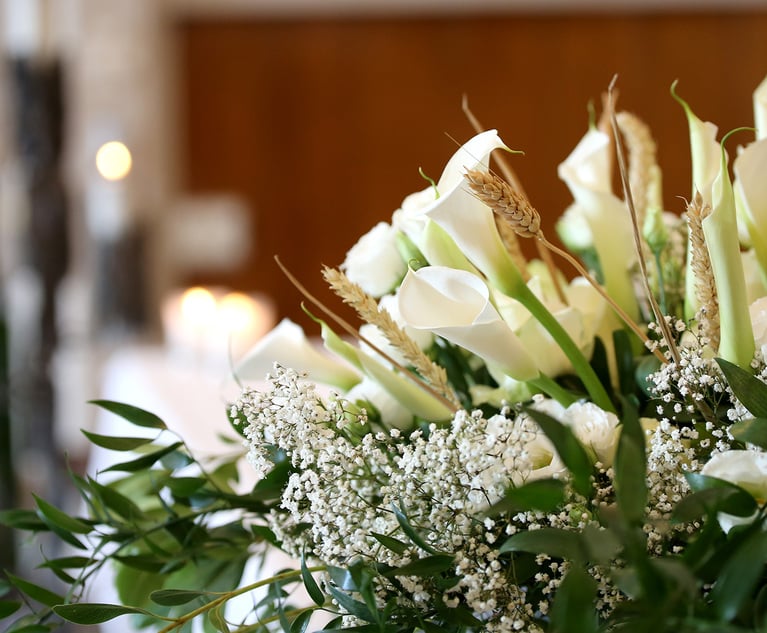Donald Robinson, a litigator known for his support of New Jersey’s federal courts and his representation of high-profile clients, died on Aug. 3. He was 98.
Robinson actively practiced law until about 10 years ago at his Newark law firm, Robinson Miller. He was a founder of the Historical Society and the Lawyers’ Advisory Committee for the U.S. District Court for the District of New Jersey, as well as the Association for the Federal Bar of the State of New Jersey.
His clients included financier Robert Brennan, wealthy socialite Doris Duke and Imelda Marcos, the former first lady of the Philippines. He was counsel to The Star-Ledger, handling labor as well as First Amendment disputes.
He was also a founder of the Battle of the Barristers lawyers’ softball league, which benefited the Newark Fresh Air Fund, said Keith Miller, who joined Robinson’s firm when he was in his 20s in 1993 and is now is a name partner.
After serving in the U.S. Army and completing law school, Robinson worked at Shanley & Fisher in Newark before starting his own firm in the city in 1971.
“Don was a kingmaker. He could get people put on the bench. And he knew everybody, and everybody knew him. He dedicated countless hours doing volunteer work for the courts, for different committees. And that was all on top of having an active practice, running a law firm. He had a very, very active practice, but he always donated a lot of time to the court. Whenever they asked him to do something, he would do it,” Miller said.
‘A Living Legend for a Long Time’
Miller said that younger lawyers in Robinson’s firm were cautioned “win, or don’t come back.” Robinson was fun to work with, but also an “exacting taskmaster,” he said.
“He was a character. He was a living legend for a long time. He wasn’t a large man in stature, but he was like a giant in the legal community,” Miller said.
Many of those working with Robinson called him “the Chief,” said Kevin Marino of Marino, Tortorella & Boyle, who was hired by Robinson in 1985 after completing a judicial clerkship.
“The Chief loved lawyers and the legal profession with all his heart, and he never lost his appreciation and gratitude for the unparalleled privilege of representing others,” Marino said. “One of his most beloved quotes—one he invoked frequently when mentoring those of us fortunate enough to be his ‘teammates’ and his ‘pals’ (never his ‘associates’ or ‘partners’)—was from the speech Lord Brougham made to the House of Lords in defense of Queen Caroline: An advocate, by the sacred duty which he owes his client, knows, in the discharge of that office, but one person in the world, that client and none other.”
“Don Robinson lived that noble principle every day of his long and extraordinary life. It was a singular blessing for so many of us to learn that animating principle from this true, sui generis giant of the bar,” Marino said.
Robinson taught young attorneys to represent clients “fearlessly,” Marino said.
“He taught us all that one could be as a lawyer, all that this extraordinary profession has to offer. He taught me that when the client comes in your office, your job is to take the weight off the client’s shoulders and put it on your shoulders,” Marino said.
‘Best Taker of Depositions I Saw in My 50 Years’
Stephen M. Greenberg of Walsh Pizzi O’Reilly Falanga in Newark was a young associate at the now-defunct firm of Shanley & Fisher when he met Robinson. Greenberg, who got to watch Robinson take numerous depositions, calls him “the best taker of depositions I saw in my 50 years of practicing law.”
Later, when Robinson started his own firm, he asked Greenberg to join him. When Greenberg chaired a committee advising then-U.S. Sen. Frank Lautenberg on federal judicial nominations, Robinson was a source of many a nomination, Greenberg said. Robinson was well-respected among lawyers and judges.
“He also understood to be decent, nice and courteous to the people who worked in the clerk’s office, and the marshals. I learned that from him,” Greenberg said. “Don taught me that lesson early on: that people who work in the clerk’s office and people who are U.S. marshals, you know, they’re also a very important part of the process.”


